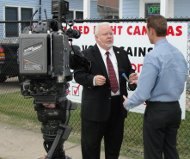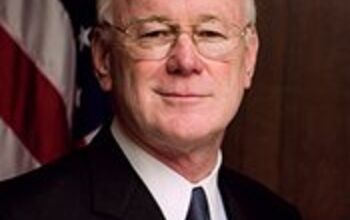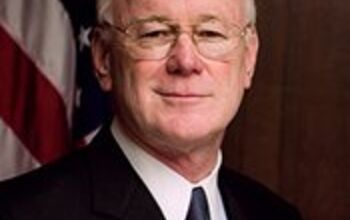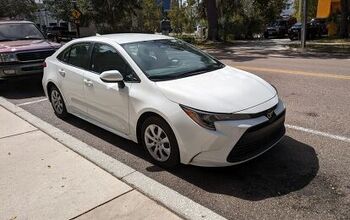Texas: Federal Judge Lets Houston Defend Camera Referendum
A federal judge sided yesterday with a traffic camera company by blocking anti-red light camera referendum sponsors in Houston, Texas from participating in an ongoing legal challenge. US District Court Judge Lynn N. Hughes will decide whether the November 2 vote of Houstonians against traffic cameras should be nullified. Hughes will now make his decision based solely on the arguments presented by supporters of photo enforcement — the city of Houston and American Traffic Solutions (ATS).
Francis and Randy Kubosh had sought to intervene in the case as the main sponsors of the effort to place the charter amendment banning red light cameras on the ballot. The pair argued that they were the only parties capable of providing a real defense to the effort of ATS to undo the election. Both the city of Houston and ATS opposed the participation of Kubosh in the case, preferring instead to settle matters amongst themselves. Hughes saw no problem with this arrangement.
“Having caused the charter’s amendment, the organizers understandably want to defend it,” Hughes wrote. “They need not defend it as long as the city itself will rigorously and thoughtfully work to vindicate it. They question the city’s commitment because of the potential for it to have mixed motivation.”
The Kuboshes have good reason to question the adequacy of Houston’s defense of the choice of the voters. In College Station last year, city attorneys drafted mediocre legal briefs in an obvious attempt to lose the case in court. The Kuboshes provided specific examples of questionable arguments presented by the Houston city attorneys. They also argued that the Texas attorney general should have been notified about the case given the statewide implications of the legal questions involved. Texas law requires that this notification be given by any party suing to invalidate a municipal ordinance, but ATS made no such notice and the city did not object. Texas law also requires one advocate for a contested election to participate in any legal challenge.
“The court must permit at least one intervention on the side of the contestee, if requested to do so, and must permit the intervening contestee to participate fully in the conduct of the contest,” Texas Code 233.004 states.
Hughes ignored this statute, claiming it does not apply to post-election challenges to validity, and insisted that there was nothing wrong with letting the city, which makes $10 million a year from red light camera ticketing, defend the election results.
“The organizers say that the mayor will sell her duty for the revenue the cameras would generate and to avoid paying the city’s commitment under the contract,” Hughes wrote. “Having divergent preferences about policy is not a conflict of interests in the legal sense.”
Kubosh attorney David A. Furlow told TheNewspaper that they intended to appeal the judge’s ruling. Hughes set a December 21 deadline for the responses to the ATS motion to cancel the election results.
A copy of the ruling is available in a 2.6mb PDF file at the source link below.
Opinion on Intervention (US District Court, Southern District Texas, 12/12/2010)
[Courtesy: Thenewspaper.com]
More by The Newspaper
Latest Car Reviews
Read moreLatest Product Reviews
Read moreRecent Comments
- 1995 SC Didn't Chrysler actually offer something with a rearward facing seat and a desk with a typewriter back in the 60s?
- The Oracle Happy Trails Tadge
- Kwik_Shift_Pro4X Union fees and corruption. What can go wrong?
- Lou_BC How about one of those 2 foot wide horizontal speedometers out of the late 60's Ford Galaxie?
- Lou_BC Was he at GM for 47 years or an engineer for 47 years?


































Comments
Join the conversation
Judge Hughes sounds like a bailout advocate: this action is not legal but we're going to do it anyway because we know better than the voters.
The amounts involved are far too high to ever believe the camera company or city will do anything to disrupt that revenue stream, even when mandated by state law or local elections. If the Feds won't step in and keep their nose clean, heaven help us.